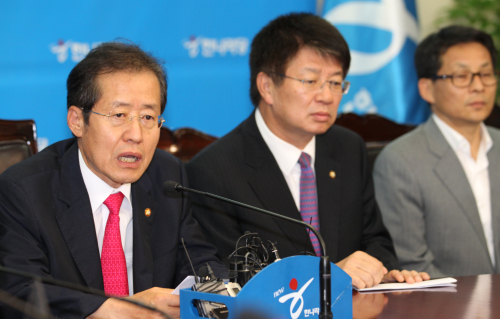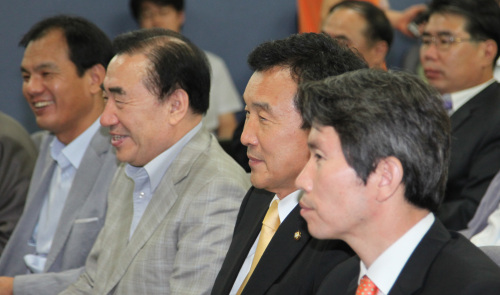The conservatives’ defeat in Wednesday’s school meals referendum in Seoul is expected to have a sizable impact on national politics in the run-up to major elections next year, political analysts said.


The poll is also seen as having revealed widespread voter support for welfare expansion, which was mainly campaigned for by the liberal opposition and adopted by an increasing number of conservative politicians.
The plebiscite, the first of its kind for the capital, was declared invalid because of low voter turnout, dealing a severe blow to Seoul Mayor Oh Se-hoon and the ruling Grand National Party which stood behind him.
Preliminary returns put voter participation at 25.7 percent, way below the required quorum of 33.3 percent.
“I humbly accept the outcome,” Oh said in a brief press conference, acknowledging his defeat.
The referendum, although it was originally called to set the scope of beneficiaries of free school lunches, had turned into a political battle between the two main rival parties ahead of parliamentary elections in April and the presidential ballot in December next year.
Attempting to contain possible fallout, GNP Chairman Hong Joon-pyo played down the referendum’s failure, while attacking the opposition for its vote boycott campaign.
“The voter turnout exceeding 25 percent is a telling proof that Oh’s policy is right,” he claimed.
Some GNP members said that the failed referendum’s silver lining was that it helped consolidate the conservative support base ahead of crucial votes next year.
Liberal opposition parties were triumphant, as the vote gave them a much-needed upper hand against the conservative ruling bloc. The main opposition Democratic Party had campaigned for a boycott of the referendum.
“Voters in Seoul have chosen the path to a welfare state,” DP leader Sohn Hak-kyu.
It vowed to continue campaigning to deliver greater welfare to workers and to step up efforts to narrow the widening gap between rich and poor.
The far-left minority New Progressive Party called the referendum outcome a judgment on Oh, President Lee and the GNP.
“Seoul citizens made it clear that they wanted to judge Oh through the referendum and gave a warning to the GNP and President Lee,” said Gang Sang-gu, its spokesperson.
Political observers said that the rival parties will likely compete to throw out more welfare pledges to woo voters, as the referendum has effectively dampened conservative criticism of “welfare populism.”
“(The referendum) showed that the conservatives have failed to read voter sentiment which is leaning toward greater welfare,” Prof. Choi Han-su of Kunkuk University said.
Some experts took a step further to predict that President Lee, who rallied behind Oh in his fight against the universal benefit plan driven by “populist” politicians, will find himself a step closer to a lame-duck status.
At Wednesday’s referendum, voters were asked to choose between two options: one to provide free meals to all schoolchildren regardless of income and the other to give them only to the poor.
Although ballot boxes were never opened, those who voted are believed to be supporters of the partial benefit plan, proposed by the mayor.
Oh’s opponents had campaigned for a boycott of the referendum, as it was called by the mayor with the aim of invalidating the universal plan endorsed by the city council.
The vote’s nullification also means that Oh, seen by many GNP members as a politician of presidential caliber, will have to leave the mayor’s office.
In a desperate effort to elevate voter turnout, Oh had vowed to give up his mayoral post if the referendum fizzled or if voters turned down his proposal of giving free lunches only to poor students.
His departure would be a chance for the DP to seize the mayoral office of the capital, where nearly a quarter of Korean population resides. President Lee Myung-bak held the post before becoming president in 2008.
By Lee Sun-young (milaya@heraldcorp.com)











![[Today’s K-pop] BTS pop-up event to come to Seoul](http://res.heraldm.com/phpwas/restmb_idxmake.php?idx=644&simg=/content/image/2024/04/17/20240417050734_0.jpg&u=)




![[KH Explains] Hyundai's full hybrid edge to pay off amid slow transition to pure EVs](http://res.heraldm.com/phpwas/restmb_idxmake.php?idx=652&simg=/content/image/2024/04/18/20240418050645_0.jpg&u=20240419100350)

![[Today’s K-pop] Zico drops snippet of collaboration with Jennie](http://res.heraldm.com/phpwas/restmb_idxmake.php?idx=642&simg=/content/image/2024/04/18/20240418050702_0.jpg&u=)